What is the density of water lb/ft3?
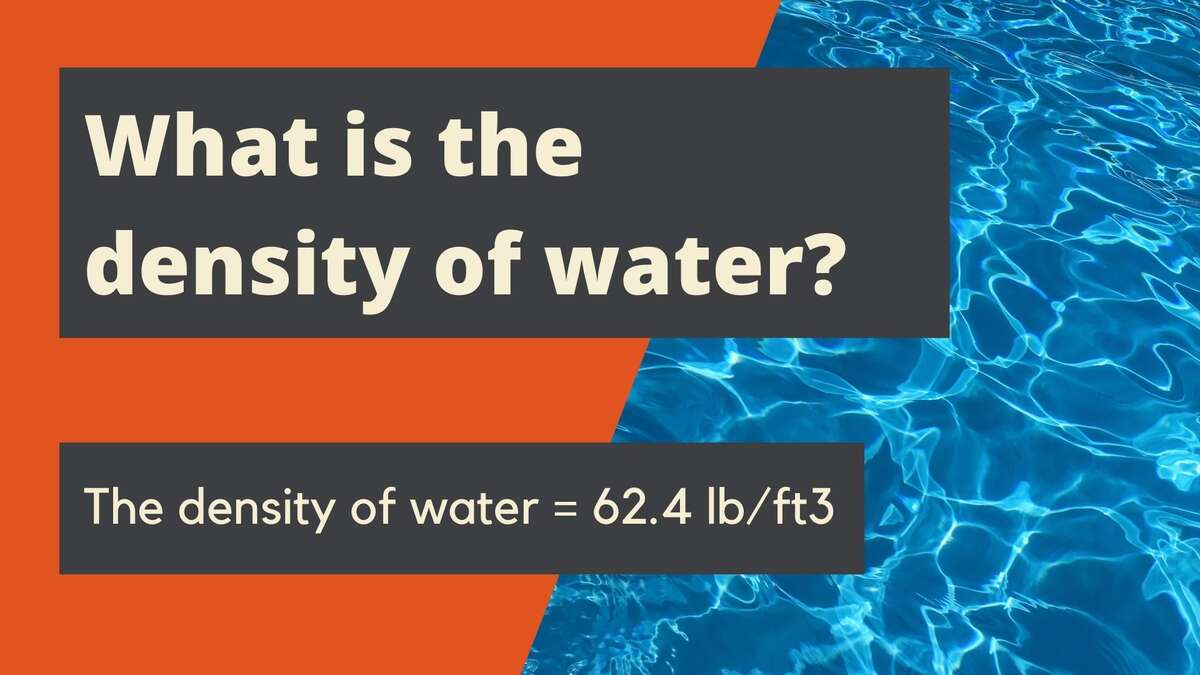
The density of water – are you wondering what it is exactly? If yes, you couldn’t have chosen better. This article is a huge compendium about water density lb/ft3. So keep reading to finally know the most important information about the density of water lb/ft3.
| Unit | Water Density |
| Density of water g/cm3 | 1 g/cm3 |
| Density of water g/mL | 1 g/mL |
| Density of water kg/m3 | 1000 kg/m3 |
| Density of water lb/ft3 | 62.4 lbs/ft3 |
What can you find in this article? First of all, the density of water at standard conditions in lb/ft3. Moreover, we will tell you a little about water density at different temperatures and also show you how you can calculate the density lb/ft3. As you can see, we gathered here all you need to know about the water density in pounds per cubic feet.
We will start with the basics. We want to explain to you what the density is exactly. So what is the definition of density? The density of a substance is its mass per unit volume. The density is sometimes called the volumetric mass density or specific mass.
This definition is also correct when it comes to water. How does it look after a little modification? The density of water is its mass per unit volume. It’s a simple definition, isn’t it?
To be more specific, here you can see the definition of density of water lb/ft3: Mass of water given in pounds per its volume given in cubic feet.
But this definition is not sufficient for you. Of course, it is a basic thing you need to know, but you have to pay attention to 2 more things. What are we talking about?
The density of water depends on many factors. We want to tell you about the 2 of them, the most important ones.
The first of these is the temperature of water. The second one is the salinity of water. When even one of these 2 factors changes, the density of water also changes. That’s why only the definition of water density is not sufficient.
We will tell you more about differences in the density of water caused by changes in temperature or the salinity level in next parts of this article. But now let’s focus on the water density lb/ft3 at all.
Density of water lb/ft3 – the basic value
The density of water in different units has its basic value. It works the same when it comes to the water density in lb/f3. What is this ‘basic value’? It is the most commonly known value of the density of water in a particular unit, in this case lb/ft3.
So when someone, for instance, your Physics teacher, asks you: what is the density of water lb/ft3, you can say this value and it will be the correct answer.
But before you can answer the question like that, firstly we need to give you the answer. So what is the density of water lb/ft3? The answer is 62.4. You can see this result also down below:
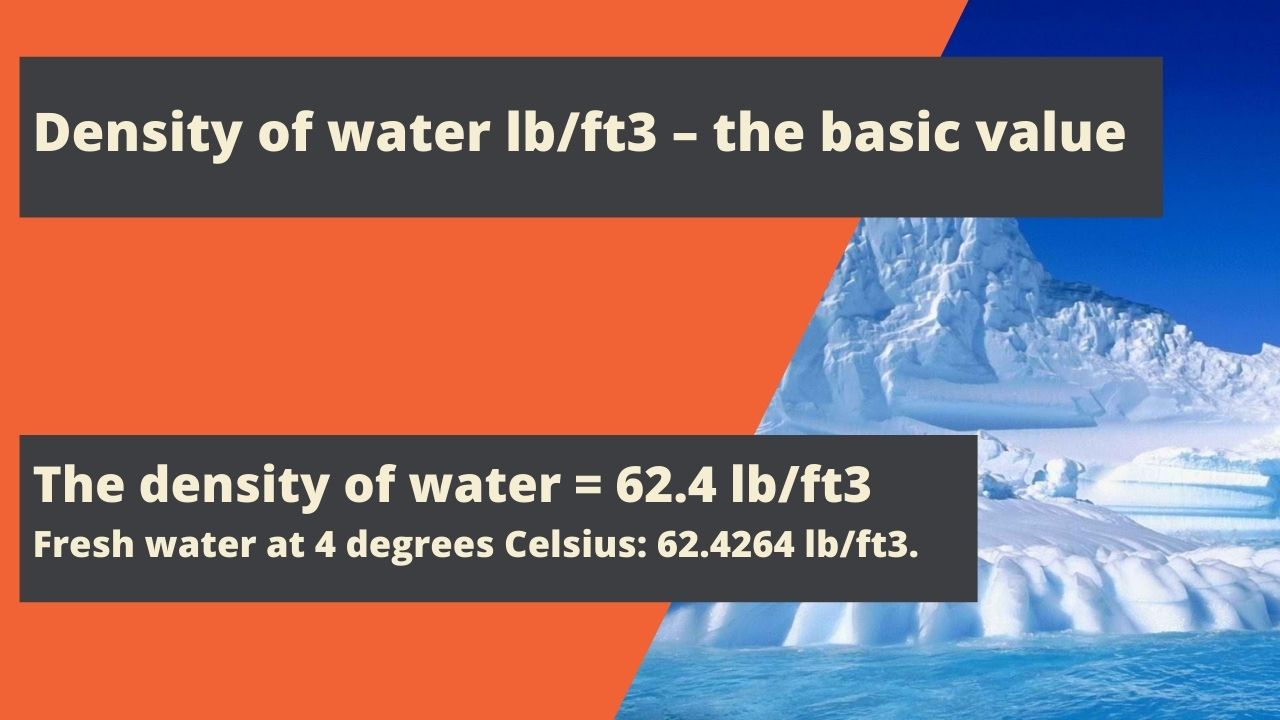
And now we want to tell you a little more about this value of the water density lb/ft3.
First, you have to know that this value is rounded off to one decimal place. It means it is not an exact value, but only an approximation which will be totally sufficient in everyday life.
Second, we want to discuss this value in light of the temperature and salinity.
You have to remember that this basic value is given at a particular temperature – that is at 4 degrees Celsius (39.2 degrees Fahrenheit).
And what about salinity of water, which has the density equal to 62.4 lb/ft3 at 4 degrees Celsius? You have to know that this value is given for fresh water and pure water. There is no salinity in both cases.
And as we said before, this value is rounded off. Here is the exact value for fresh water at 4 degrees Celsius: 62.4264 lb/ft3.
A little tidbit – this value in the full version which we gave you above is also the maximum of the density of water. Why? At 4 degrees Celsius in water acts 2 opposing effects, which ‘extend’ water. On the one hand, the water molecules move faster, on the other hand, in water starts forming clusters.
So if you know the basic value of density of water lb/ft3 and what are the conditions like temperature and salinity then, we can move on to the next, more specific, parts of this article.
Water density in lb/ft3 at different temperatures
How does the density of water lb/ft3 change at different temperatures? Are these values similar to 62.4 lb/ft3 or totally different? The answers to these questions you will find down below.
We think the best way to show you different values of the density of water lb/ft3 at different temperatures is gathering these results in a chart. But we want to discuss more fully 2 examples before we give you the table.
Which 2 examples do we mean? Freezing and boiling point. These 2 temperatures are definitely the most important. Of course, except the maximum water density at 4 degrees Celsius, which is the basic value as we mentioned before.
Let’s start with the freezing point. You probably know that, but we have a quick reminder for you. Water freezes at 0 degrees Celsius (32 degrees Fahrenheit).
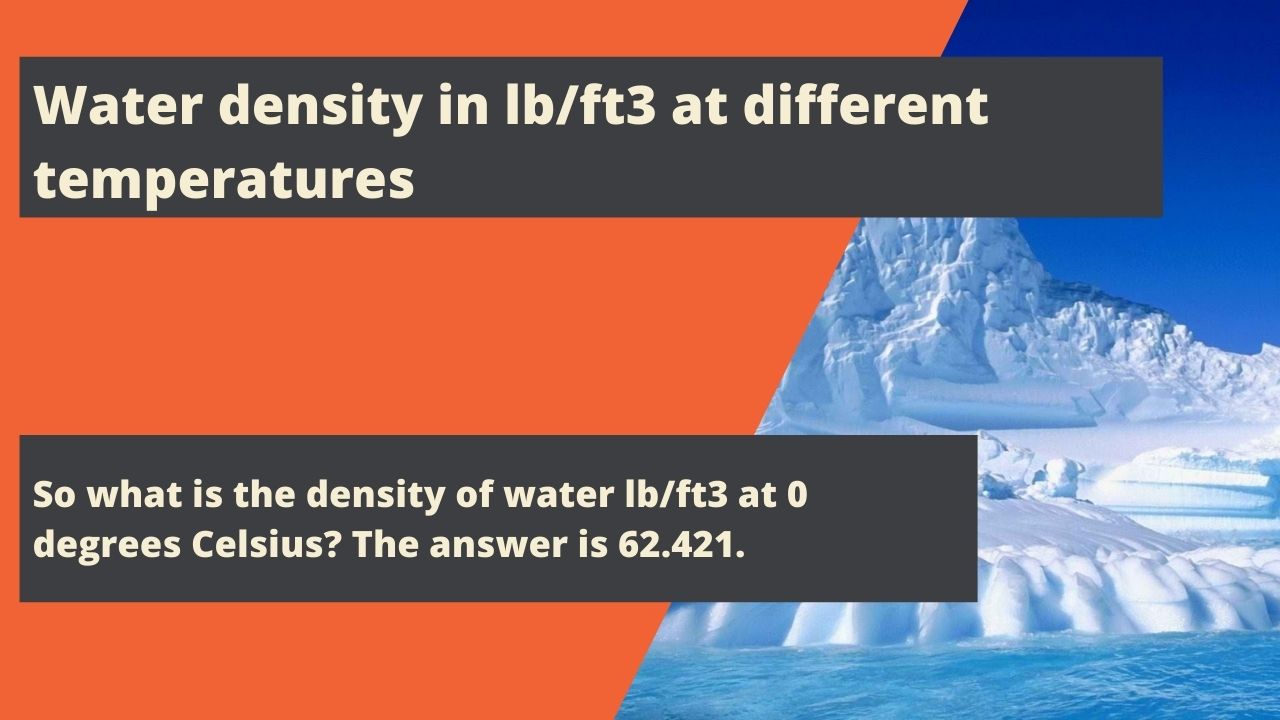
As you see, there is no big difference between this result and the value of water density at 4 degrees Celsius.
Let’s check how it looks when it comes to the boiling point. And again – a quick reminder. The water boils at 100 degrees Celsius (212 degrees Fahrenheit).
So what is the density of water lb/ft3 at 100 degrees Celsius? The answer is 59.8294. This time the difference is quite big as you can see. Of course, it is not a spectacular difference, but there is no doubt that it matters.
Okay, the 2 temperatures, which we wanted to discuss widely are behind us. The other examples of the values of the water density lb/ft3 you can see in the table down below.
The density of water in lb/ft3 chart:
| Temperature | Density of water |
| 0°C/32°F (freezing point) | 62.421 |
| 4°C/39.2°F (maximum) | 62.4264 |
| 10°C/50°F | 62.4062 |
| 20°C/68°F | 62.3148 |
| 30°C/86°F | 62.1577 |
| 40°C/104°F | 61.9441 |
| 50°C/122°F | 61.6822 |
| 60°C/140°F | 61.3785 |
| 70°C/158°F | 61.0382 |
| 80°C/176°F | 60.6651 |
| 90°C/194°F | 60.2619 |
| 100°C/212°F | 59.8294 |
Download Density of water conversion chart document
Density of seawater lb/ft3
The values of the water density in lb/ft3 are behind us, so let’s focus on salinity of water. What do you think – the seawater has the same density as the fresh water? Or maybe is it a totally different density? Have a look at the explanation down below.
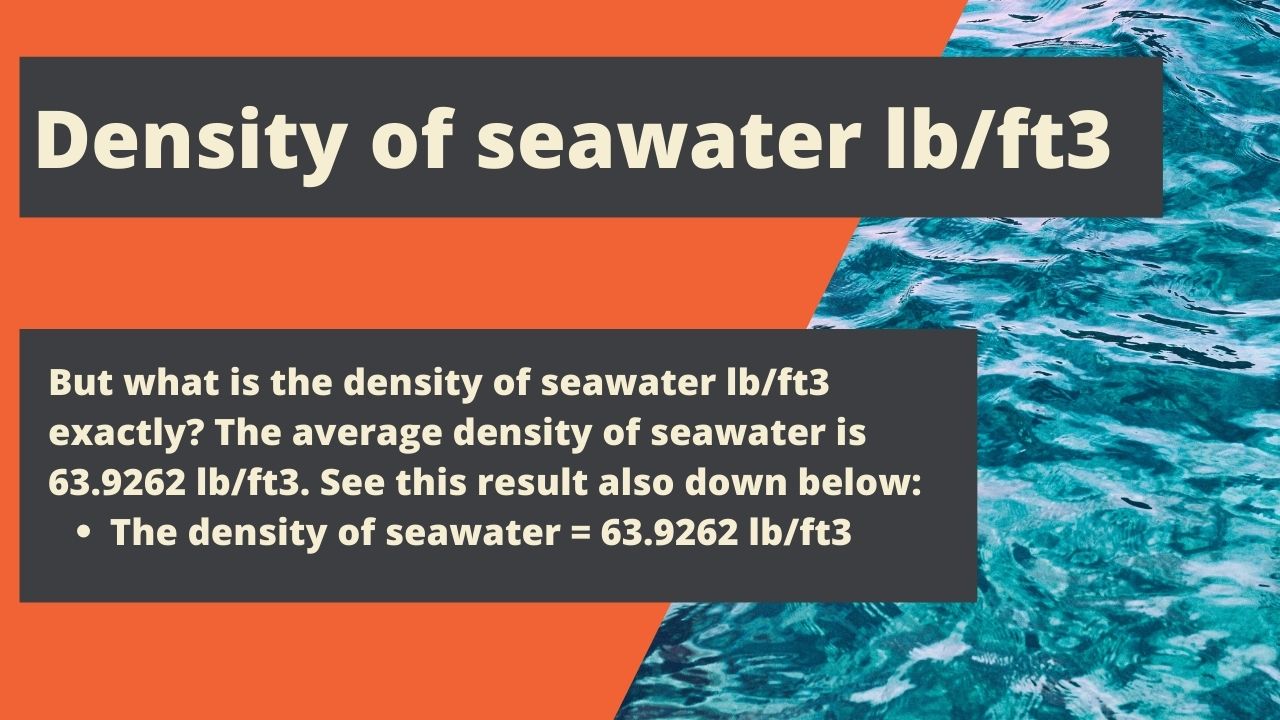
The simplest answer is: the density of seawater is not equal to the density of fresh water. To be more precise, the density of the seawater is higher than the fresh water. Why? If you add the salt to the water, its mass will be bigger. And as you may know, the mass affects the density. There is one rule – the bigger mass, the higher density.
But what is the density of seawater lb/ft3 exactly? The average density of seawater is 63.9262 lb/ft3. See this result also down below:
- The density of seawater = 63.9262 lb/ft3
It is a base value, but, of course, as in the case of the fresh water, this time it also may vary. The density of seawater lb/ft3 can reach even the result 64.1322. As you can see, maybe it is not a big difference, but it can be significant in some cases.
Of course, the seawater density also changes when the temperature changes, but we think that the information which we gave you above is sufficient at this time and this level of advance of the article.
There is only one part of the article left. We are going to show you how you can find the density of the water in 2 ways.
How to calculate the density of water
It will be the most practical part of this article. We will show you how you can find the density of water in 2 ways. To be honest, one of these methods will be calculating and the second will be just checking with a special tool.
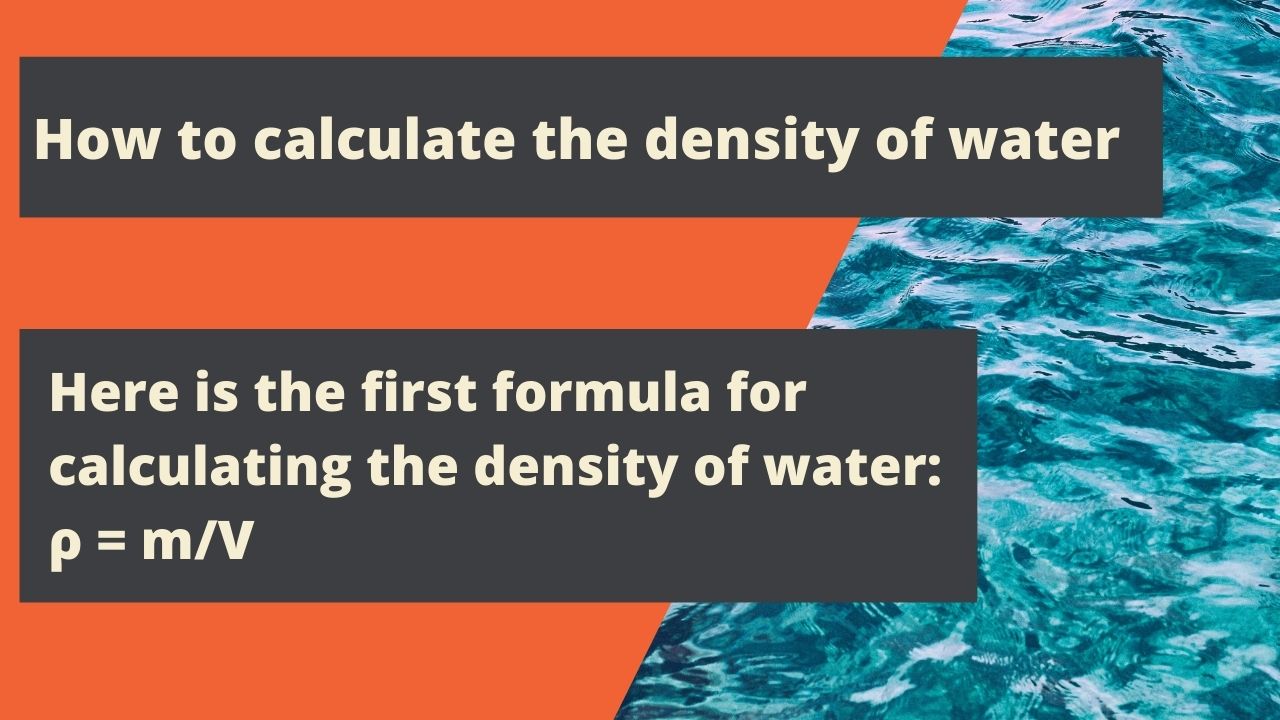
Let’s start with the first method now, which requires making calculations.
Here is the first formula for calculating the density of water:
ρ = m/V
And here is an explanation – ρ is the density, m is the mass and V is the volume. A little tidbit – ρ is spelled rho, it is a Greek letter.
So how can you use this formula? You just need to divide the mass of water by the volume of water. It’s quite simple, isn’t it?
Have a look at an example now. You need to calculate the density of water for these data:
- m = 500 lbs;
- V = 25 ft3.
The equation for calculating density of water lb/ft3 will be look like this:
500 lbs / 25 ft3 = 20 lb/ft3
So the density of water is equal to 20 lb/ft3 in this case.
And how can you just check the density of water without making any calculations on your own? We want to tell you a little about a special tool, that is about a hydrometer. It looks similar to a thermometer, but the hydrometer has a bulb at one end to make it float on the water.
How to use a hydrometer? Just lower the hydrometer in water until it is floating on its own. Remember – do it gently and slowly. Then check where the water ends and read the number. It will be the density of water.
The hydrometer will be the perfect tool for those of you who do not like calculating on your own. Checking the volume using the hydrometer can be also a good fun for children.
Which method do you like the most – calculating on your own or using the hydrometer? We are very curious which one will win in this combination!
We are coming to the end of this article. We hope that after reading it the topic of the density of water is finally clear for you. This article is a huge compendium. We are convinced that this article will help you not only in everyday life, but also during preparation for school or uni tests.
But we have a little gift for you at the end. What is it? A little FAQ section. We gathered here for you the most important information in a nutshell. It can be a quick reminder too. Have a look:
- What is the definition of a density? The density of water is its mass per unit volume.
- Density of water at 4°C (39.2°F) in lb/ft3: 62.4.
- What are the freezing and boiling points of water? Water freezes at 0°C (32°F) and boils at 100°C (212°F).
- What is a formula for calculating density of water? The formula is: ρ = m/V.
Do you want to know a little about water density in other units? Check also our other articles, for instance, about the water density g/cm3.
Or maybe do you just need to convert one density unit into another? The density converter will be perfect for you. Try, for example, the lb/ft3 to kg/m3 converter.









